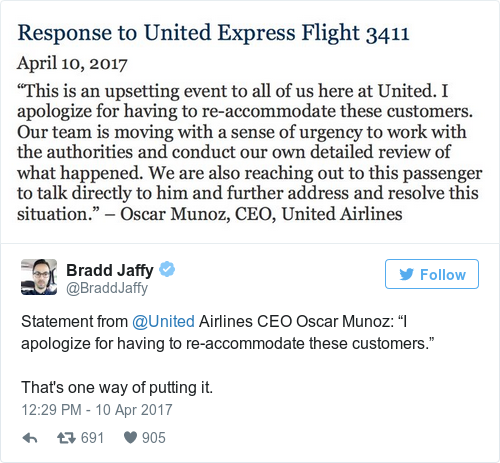If you missed the United Airline “incident” of April 9th 2017, where were you? The horrific images of a passenger being dragged bloodied and screaming from a United Airlines plane were soon the social media event of the day and trended on Facebook and Twitter. In this article, I’m not looking at the incident itself but at the 5 social media lessons we learnt from United Airlines.
What Happened?
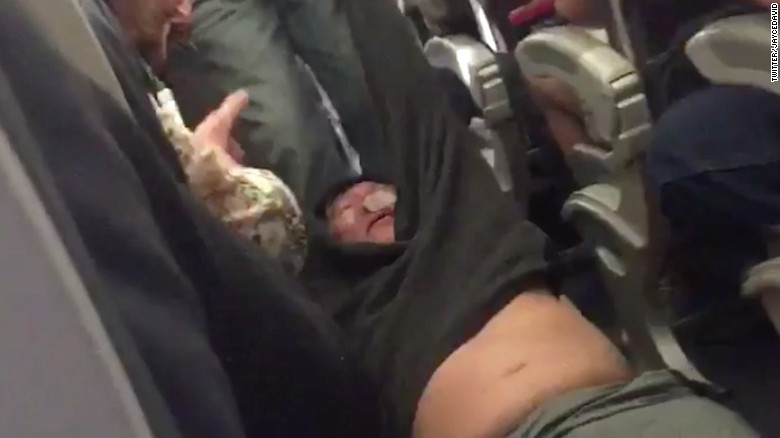
In case you really did miss it, here’s how the incident went down. Paying passengers were seated on the aircraft ready to depart. The airline had asked for volunteers to give up their seats for airline staff who needed to get to their destination. When no volunteers came forward, they began by offering $400, and then when no one came forward, $800 per passenger. When no one agreed to leave the flight, United selected four passengers at random. Three got off, but the fourth, a doctor, refused, stating that he had patients to visit. Airline staff then called airport security who grabbed the man and dragged him off the aircraft. Mobile videos taken by numerous passengers showed the man bloody, possibly unconscious and certainly distressed. Background noises also showed the distress of other passengers further illustrating the unnecessary brutality of the incident.
The airline is not a stranger to bad PR, having hit the headlines only a few weeks prior, for refusing to allow two teenagers to fly wearing leggings. They didn’t handle it particularly well on social media then either:
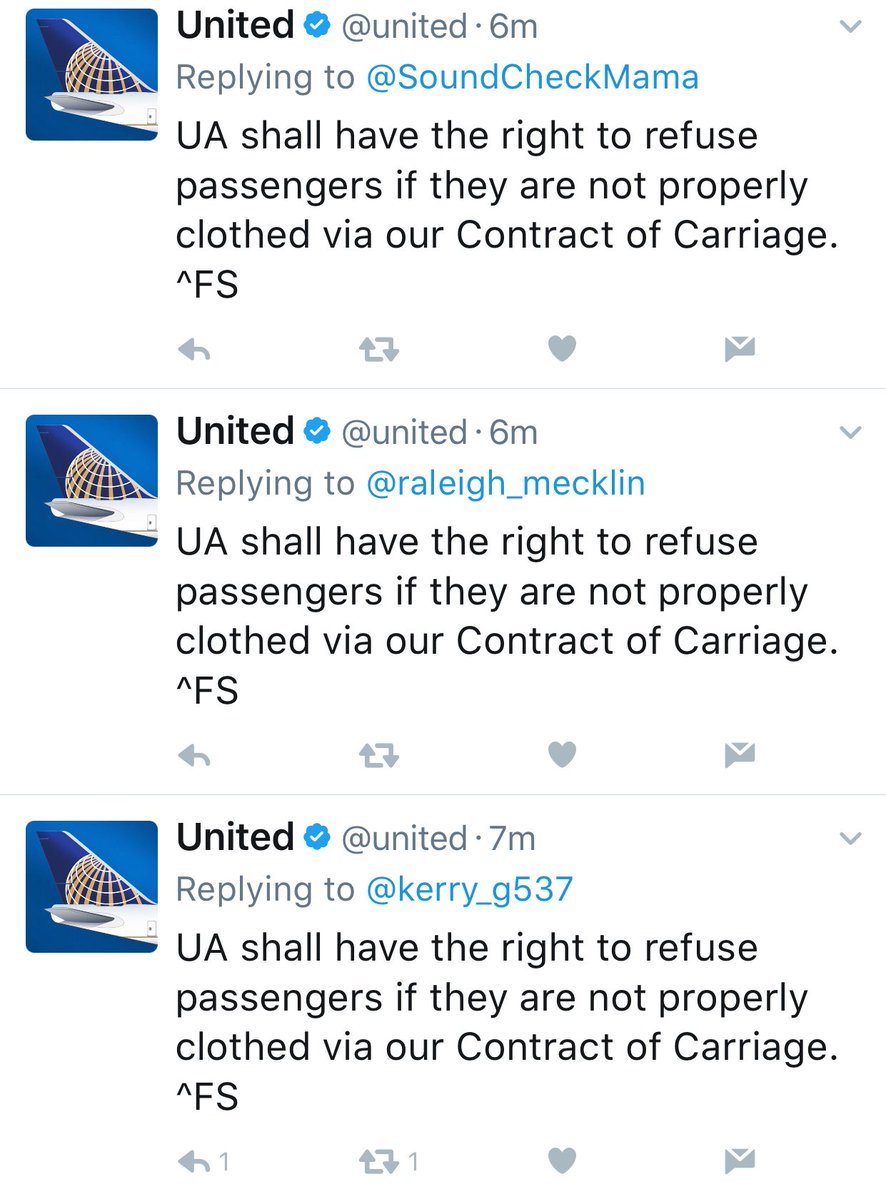
You might think therefore, that United Airlines would have a rock solid PR and social media strategy for dealing with a crisis. Think again. In fact, their poor social media strategy compounded the PR disaster and sent airline stocks falling and passengers foaming at the mouth in fury. Here are the 5 social media lessons we learnt from United Airlines.
-
Social Media Speed Is Everything In A PR Crisis
Handling a PR crisis on social media requires speed and agility which requires a plan. United Airlines were inactive on social media, leaving their accounts to gather fury for several days. An airline such as United should have a social media team on standby to help field comments, reply to concerned passengers and manage updates. Instead, paying customers were venting, cancelling tickets and promoting other airlines.
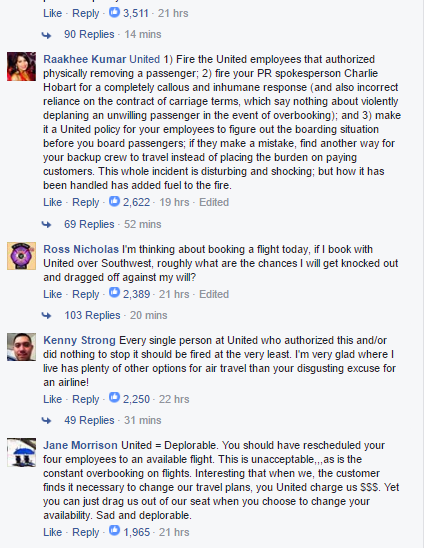
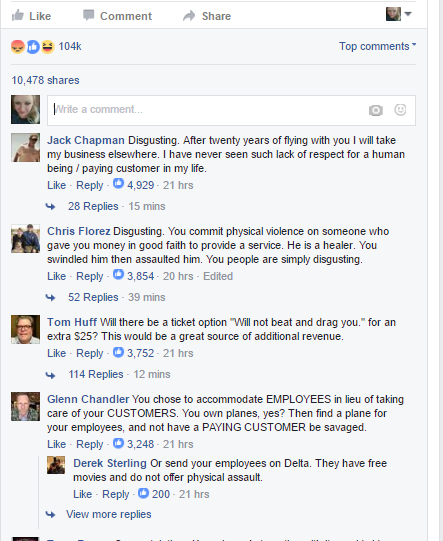 It is essential that large corporations have a plan for dealing with a PR crisis on social media. This will include addressing the following points:
It is essential that large corporations have a plan for dealing with a PR crisis on social media. This will include addressing the following points:
- Who the decision makers will be
- Who will implement the updates
- Which communication channels you will use
- What to do if key players are away
- A plan to speed up creative processes
- An “out of office hours” emergency plan
2 Tactless Press Statements Make Things Worse
Just to clarify, I don’t blame the United Airlines social media manager or content manager for this one. Having worked these roles for large institutions I know that I was completely bound by the company lawyers and directors who know nothing of social media or PR. This point is therefore aimed at them. When your company encounters negative PR, especially when it involves the general public, it is essential that the initial statement is not tactless. Given that video footage was already circulating of the man being forcibly removed, the sentence from CEO Oscar Munoz “I apologise for having to reaccommodate these customers” stirred up a massive backlash on social media as you can see below.
It is important for companies to think beyond their legal obligations when making a press statement. Whilst many companies don’t wish to comment until they know all the facts, a simple and less controversial statement would have been better received. Perhaps something like “This is an upsetting event for all of us at United and we will be investigating immediately.” A bad PR incident, if handled correctly, can be salvaged. This one wasn’t. This may sound like a very obvious thing to say, but today’s airline passengers will all have smartphones and these will have high quality cameras. The incident was captured and circulated on social media and therefore any statements made afterwards on social media should have reflected this.
3. Employee Leaks Will Always Occur So Be Careful What You Say
It is incredibly naive to think that in a large corporation, employees will not leak information to the media. The following memo sent by the CEO to United Airlines employees, was quickly leaked to the press sparking further public fury. It sparked fury because; passengers had witnessed and filmed the event, the compensation was not $1,000 and let’s face it, the passenger didn’t deserve the treatment he received. The airline were also accused of victim shaming and even of creating negative PR surrounding the man’s personal life in order to justify their actions. Not cool United, not cool.
We sought volunteers and then followed our involuntary denial of boarding process (including offering up to $1,000 in compensation) and when we approached one of these passengers to explain apologetically that he was being denied boarding, he raised his voice and refused to comply with crew member instructions.
He was approached a few more times after that in order to gain his compliance to come off the aircraft, and each time he refused and became more and more disruptive and belligerent.
Our agents were left with no choice but to call Chicago Aviation Security Officers to assist in removing the customer from the flight. He repeatedly declined to leave.
Chicago Aviation Security Officers were unable to gain his co-operation and physically removed him from the flight as he continued to resist – running back onto the aircraft in defiance of both our crew and security officials.
The lesson that we need to take on this point, is that anything you send to an employee could end up on social media. If you’re not happy for that to happen and haven’t considered the long term consequences then don’t sent it. Any apologies you need to make later will be made harder if you have said the opposite internally.
4. If You Don’t Handle It Right, Expect To Become A Hashtag
Trending hashtags often spring up from an unfortunate PR event and United Airlines was no different. Hashtags included #United #UnitedAirlines and even #NewUnitedAirlinesMotto and they were packed with memes, gifs and videos. As you can see below, the tweets were pretty entertaining. Unless you’re a shareholder of United of course.
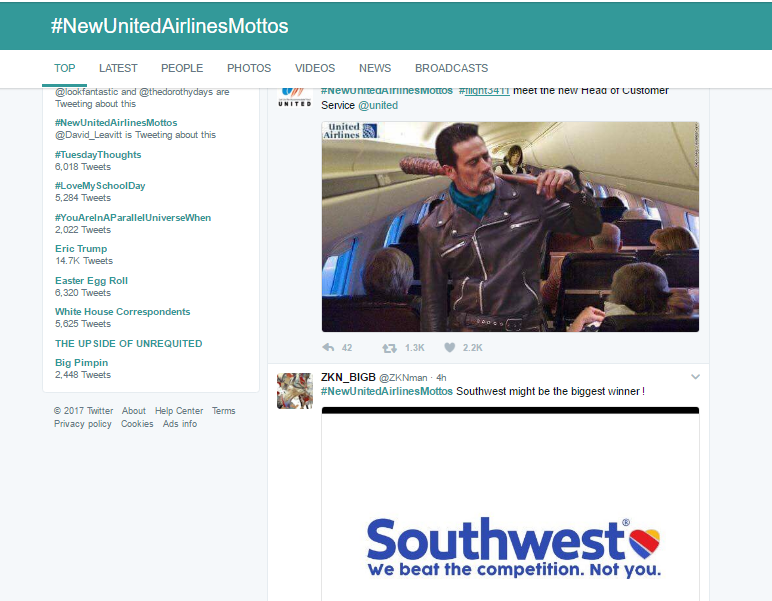
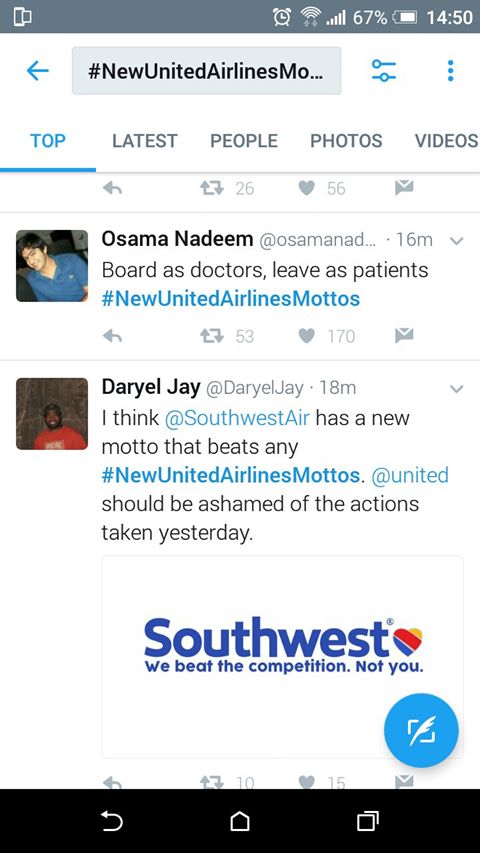
The thing is, hashtags adapt and morph into new ones and in the case of United, the lack of official clarification or response in combination with the CEO’s tactless statement made them worse. Has the incident been handled correctly, it may not have trended for days on Twitter.
5. Be Human, Be Real, Be Sorry
So an initial investigation has been conducted, video footage analyses, customers interviewed and investigations conducted. Let’s say you were wrong. Your airline made a mistake and did in fact treat a paying passenger appallingly.. what do you do? Here are some suggestions to salvage your social media rep:
- Apologise. Humbly and sincerely on all your channels
- Make a public appearance, as the CEO and show you are genuinely sorry
- Make and publish changes to your corporate policy to avoid similar incidents in the future
- Manage the lawsuit effectively to avoid further bad PR
- Understand the strength of public feeling and aim to win back support
- Communicate new policies to staff and retrain them if necessary
Large corporations are often very bad at showing the human side of their organisation and yet social media is a very effective tool for helping you do this. Social media interviews, charity sponsorship, public apologies and goodwill gestures are all olive branches you can use to rebuild your name.
So, if you are a big brand there are certainly lessons you can learn from the United Airlines incident. Bad PR happens but how you handle it is critical to the success of your business. Need help handling your social media channels? Get in contact with me here. Love these social media lessons? Go ahead and share!
